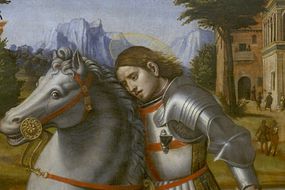From 20 September to 19 November 2023
As part of the celebrations for the 100th anniversary of the birth of the Lucanian poet Rocco Scotellaro (Tricarico, 19 April 1923 - Portici, 15 December 1953), promoted by the Basilicata Region and APT with the patronage of the Municipality of Tricarico and the Matera Basilicata 2019 Foundation, the National Gallery of Modern and Contemporary Art pays homage to him with the exhibition And my homeland is where the grass trembles. 45 artists of today reread the work of Rocco Scotellaro.
The exhibition, curated by Giuseppe Appella, welcomes 45 artists of seven generations: Carlo Lorenzetti, Ruggero Savinio, Mario Raciti, Giuseppe Pirozzi, Paolo Icaro, Giulia Napoleone, Claudio Verna, Emilio Isgrò, Mario Cresci, Assadour, Giancarlo Limoni, Mimmo Paladino , Stefano Di Stasio, Sandro Sanna, Ernesto Porcari, Gregorio Botta, Giuseppe Modica, Giuliano Giuliani, Nunzio, Lucilla Catania, Roberto Almagno, Claudio Palmieri, Giovanna Bolognini, Giuseppe Salvatori, Gianni Dessì, Marco Tirelli, Felice Levini, Enrico Pulsoni, Salvatore Cuschera, Andrea Fogli, Franco Fanelli, Giuseppe Caccavale, Elvio Chiricozzi, Elisabetta Benassi, Giuseppe Capitano, Ciro Vitale, Giuseppe Ciracì, Pierpaolo Lista, Francesco Arena, Alberto Gianfreda, Laura Paoletti, Ilaria Gasparroni, Antonio Della Guardia, Veronica Bisesti, Ado Brandimarte . They are artists who have had constant relationships with poetry, often coming from the regions that Rocco frequented.
Seven months ago, the volume Rocco Scotellaro, Tutti le Opere (Mondadori Editore Milano 2019) was sent to them for a reading-comparison that would lead not only to the creation of a work but also to a written page useful for putting into highlights the word-image relationship and how appropriate it was to talk about Scotellaro, not only from a sociopolitical point of view but also on a more exquisitely literary level. Precisely because, as Emilio Isgrò writes on his page in the catalog published by Silvana Editoriale, "it is enough to read a few verses to feel that Scotellarian music, with all its popular singing, is radically different from the hermetic one". And, furthermore, "to point out whether it is not possible for the South to reopen, today, the messianic promise of growth and salvation that has always been affirmed and never kept". Because "it is art and literature, that is, disinterested and strong dreams, that politics needs today to re-establish itself".
A way to revive the intense political-cultural debate of the first half of the fifties but also to take note of Scotellaro's broad interests evident in his journalistic prose, cinematographic writings and artistic acquaintances (through Mauro Masi-Michele Giocoli-Remigio Claps before , Carlo Levi, Ernesto De Martino, Adriano Olivetti, Amelia Rosselli, Giorgio Bassani, then Leonardo Sinisgalli), all addressing the issues and needs of our time. Which we find in the titles of the works created for the occasion, using all contemporary languages: I am a blade of grass, I dare, like the tree of the wind, Life is enclosed within four walls, Pyramids of stars, The face of land we have, Between me and you I want to plant an orchard, The sky with its mouth open, The earth holds me, Peasants of the South, A breath can transplant my seed far away, It's day, Bianco for Rocco, The crowd of beggars, Other wings will flee, Tomolo, Distant sea, One is distracted at the crossroads, Where the sky borders, I am one of the others, Even a stone, The dawn is always new.

Viale delle Belle Arti, 131, Rome, Italy
Opening hours
| opens - closes | last entry | |
| monday | 09:00 - 19:00 | |
| tuesday | 09:00 - 19:00 | |
| wednesday | 09:00 - 19:00 | |
| thursday | 09:00 - 19:00 | |
| friday | 09:00 - 19:00 | |
| saturday | 09:00 - 19:00 | |
| sunday | 09:00 - 19:00 |

From 31 October to 1 March 2026
San Giorgio. The journey of a holy knight from the East to Genoa.

Royal Palace Museum, Genoa